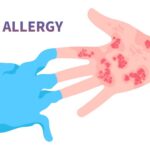
Knowledge

What is Monkeypox and is there a treatment?
Monkeypox virus is a disease that typically affects rodents or nonhuman primates, but may occur in humans. It is native to Central and Western Africa but may spread due to international travel, imported animals, or close contact with an animal or person with monkeypox. The symptoms of Monkeypox include: fever, rash, headache, muscle aches, chills,…

What is palliative care?
Palliative care is an important part of a medical team that helps to manage diseases and improve the quality of life for both the patient and the family. Palliative care is specialized medical care for people with serious illnesses. It is focused on providing patients with relief from the symptoms, pain and stress of a…

How do antibiotics work?
Not all antibiotics are created equal! For many years scientists have studied ways to tailor antibiotics to kill specific bacteria without killing others. This type of work is ongoing and painstaking, but incredibly beneficial to society as a whole to prevent antibiotic resistance. The mechanism of action of antibiotics varies by class of the medication,…

Aside from taking my medications, what can I do to improve my symptoms of Polycystic ovarian syndrome (PCOS)?
Polycystic ovarian syndrome (PCOS) is one of the most prevalent endocrine-metabolic disorders in females affecting 5 to 10% of women (UpToDate). The exact cause of PCOS is unknown. Women with PCOS can struggle with infertility (irregular periods) and weight gain, as well as with excessive facial and body hair growth, hair loss, and type II…

Do I need to avoid sun exposure on antibiotics?
Fun in the sun can sometimes be limited by medications that interact with sunlight exposure. Some medicines contain ingredients that may cause photosensitivity, this means increased sensitivity to sunlight that can cause sunburn-like symptoms, a rash or other unwanted side effects. (Food and Drug Administration). Photosensitivity can occur after exposure to ultraviolet light – either…

Why do antibiotics give me a yeast infection?
The human body is a host for billions of organisms that work to keep us healthy by balancing pH, aiding in digestion, and protecting certain tissues. As strange as it may seem, fungus is one of those organisms that live within your body, specifically the yeast kind called candida. Normally, candida does not cause any…

Do you get a rash from covid?
Dermatological diseases, such as measles and chickenpox, cause a distinctive rash that helps medical providers diagnose a patient. COVID-19 is different because there is no single COVID-19 rash, and it’s also an inconsistent symptom – it does not occur in every case of the infection. When a patient with COVID-19 does develop a rash, it…

Different types of headaches and when to seek medical attention
Occasional headaches are extremely common and typically benign. Chronic headaches are less common and sometimes hard to diagnose. Finding patterns in chronic headaches can provide clues to the cause of the pain. Keeping a headache diary might help determine your headache type. Note when they occur, your symptoms, and potential triggers, such as food, stress…

IBS vs IBD, and what to do about them.
Inflammatory Bowel Disease (IBD) is an umbrella term used to describe disorders that involve chronic inflammation of the digestive tract. Irritable bowel syndrome (IBS) is a disorder characterized by abdominal pain or discomfort associated with altered bowel habits in the absence of structural or major inflammatory abnormalities. Types of IBD include: Ulcerative colitis: This condition involves inflammation and…

Why are my legs swollen? Possible causes and things to look for
Swollen legs can be a sign presents in certain medical conditions that are potentially life threatening. It is important to assess if the swelling is due to fluid buildup (edema) or inflammation. Inflammation is typically accompanied by pain and redness, and edema can be associated with cough, shortness of breath, and tiredness. The following are…

What vitamins can you take too much of? Signs and symptoms to look for
Nearly 50,000 instances of vitamin toxicity are reported annually to US poison control centers (Medscape). Fat-soluble vitamins have a higher potential for toxicity than do water-soluble vitamins because of their ability to accumulate in the body. Fat soluble vitamins are A, D, E, and K. The water soluble vitamins are C and B complex (B1,B2,…

I was bit by a tick/spider, now what?
Insect bites can be a scary situation when you don’t recognize the insect or when you didn’t see what bit you at all. Most spider and tick bites are harmless, but if you live or work around them, it is a good idea to be educated on the signs and symptoms as well as first…

How do I know if I need antibiotics?
Antibiotics come in many forms and appear to be versatile when it comes to treating infections, however, it is a misconception that all infections have bacteria. There is a myriad of organisms that can cause infection. When a bacterium is identified as the culprit, only then can we consider using antibiotics. The body is riddled…

Skin check: How do I know if this mole is cancer?
Living in the Sunshine State raises many concerns regarding skin cancer and recognition of abnormal moles. As we age it is common to acquire many new spots that we do not recognize, but are they something to be concerned about? Self-examination practices are imperative in the early diagnosis of skin cancer, and these tips will…







